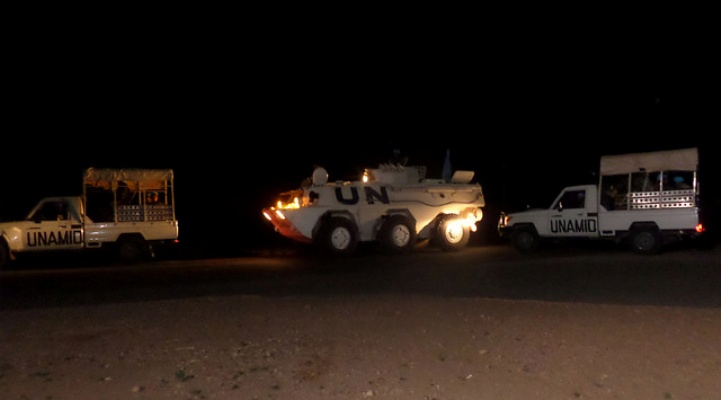UNAMID reduction leaves Darfur residents vulnerable to government abuses: report

June 26, 2017 (KHARTOUM) – The proposal to the UN Security Council (UNSC) to downsize the joint UN/AU Peacekeeping Mission in Darfur (UNAMID) is an open invitation to accelerate violence against civilians in Darfur, said a local civil rights organisation.
Earlier this month, the African Union Peace and Security Council (AUPSC) renewed the mandate of UNAMID for 12 months but ordered a significant reduction in the size of the mission.
On 14 June, United Nations secretary general officially proposed to change the mandate of UNAMID and to reduce by a half its troops. On 27 June, the UNSC is expected to adopt a resolution endorsing the AUPSC approach.
The hybrid mission will be reduced by withdrawing the military personnel by 44% and that of the police component by 30%, the closure of 11 team sites in the first phase and the withdrawal of the military component from another 7 team sites in the second phase.
The African Union and the United Nations are set to drastically drawdown the hybrid peacekeeping force (UNAMID) by withdrawing the military personnel by 44% and that of the police component by 30%, the closure of 11 team sites in the first phase and the withdrawal of the military component from another 7 team sites in the second phase.
Regional and international officials agree that the improvement of the security situation is the result of the Doha Document for Peace in Darfur (DDPD) and the defeat of holdout groups that refuse to join the framework agreement admitting that the situation in Jebel Marra requires some consideration.
In a report released on Monday, Sudan Democracy First Group (SDFG), a local civil rights organisation, said the plan to downsize the UNAMID is “an open invitation to accelerate violence against civilians in Darfur”.
The report titled “Downsizing UNAMID: A potentially fatal mistake” said the planned move “ will leave civilians in Darfur “more vulnerable to abuses of all kinds by the Sudanese army, paramilitary Rapid Support Forces and other militias operating in the region”.
It pointed out that the “UN and AU proposal is based on a flawed analysis of the current security and political situation in Darfur”, saying the situation on the ground in doesn’t support the stated reasons for the reduction of the Mission.
“Despite the reduction in clashes between the conflict parties, civilians continue to be subject to ongoing violence, primarily by entities directly or indirectly associated with the Government” read the report
“The latest UN Secretary-General report to the UNSC, for example, documents 249 attacks by governmental forces (border guards and Rapid Support Forces (RSF) on internally displaced persons (IDPs) alone between 15 December 2016 and 15 March 2017,” it added.
The report mentioned more than 100, 000 people have been displaced by clashes between government forces and the Sudan Liberation Movement (SLM-AW) led by Abdel-Wahid al-Nour in Jebel Marra.
It also pointed to a new wave of displacement resulting from the recent fighting between government forces and the SLM-Minni Minnawi (SLM-MM) and the SLM-Transitional Council (SLM-TC) in East and North Darfur.
Concerning the political developments in Darfur, the report pointed that peace talks between the government and the armed groups have ceased since August 2016, saying all attempts to revive these talks have failed.
The report further added that UNAMID has many problems but not the number of troops deployed on the ground, pointing that the Missions’ “efforts to effectively protect civilians have been constantly undermined by hostile behaviour and lack of cooperation from the Sudanese government”.
It concluded that the decision to “downsize UNAMID is a shortsighted capitulation to political pressure from the Government of Sudan and reflects a fatigue on the part of the international community”.
The Sudanese army has been fighting a group of armed movements in Darfur since 2003. UN agencies estimate that over 300,000 people were killed in the conflict, and over 2.5 million were displaced.
The hybrid mission has been deployed in Darfur since December 2007 with a mandate to stem violence against civilians in the western Sudan’s region.
It is the world’s second largest international peacekeeping force with an annual budget of $1.35 billion and almost 20,000 troops.
Recently, the United States which pays over 28% of the $7.8 billion peacekeeping budget, announced that it would cut nearly $1.3 billion of its contribution from October 2017 and urged the United Nations to take it in account.
Regarding the situation in Darfur, Washington points to the improvement of the humanitarian access in the region and to the government’s efforts to reduce violence on civilians saying there are no longer air raids on civilians.
(ST)
